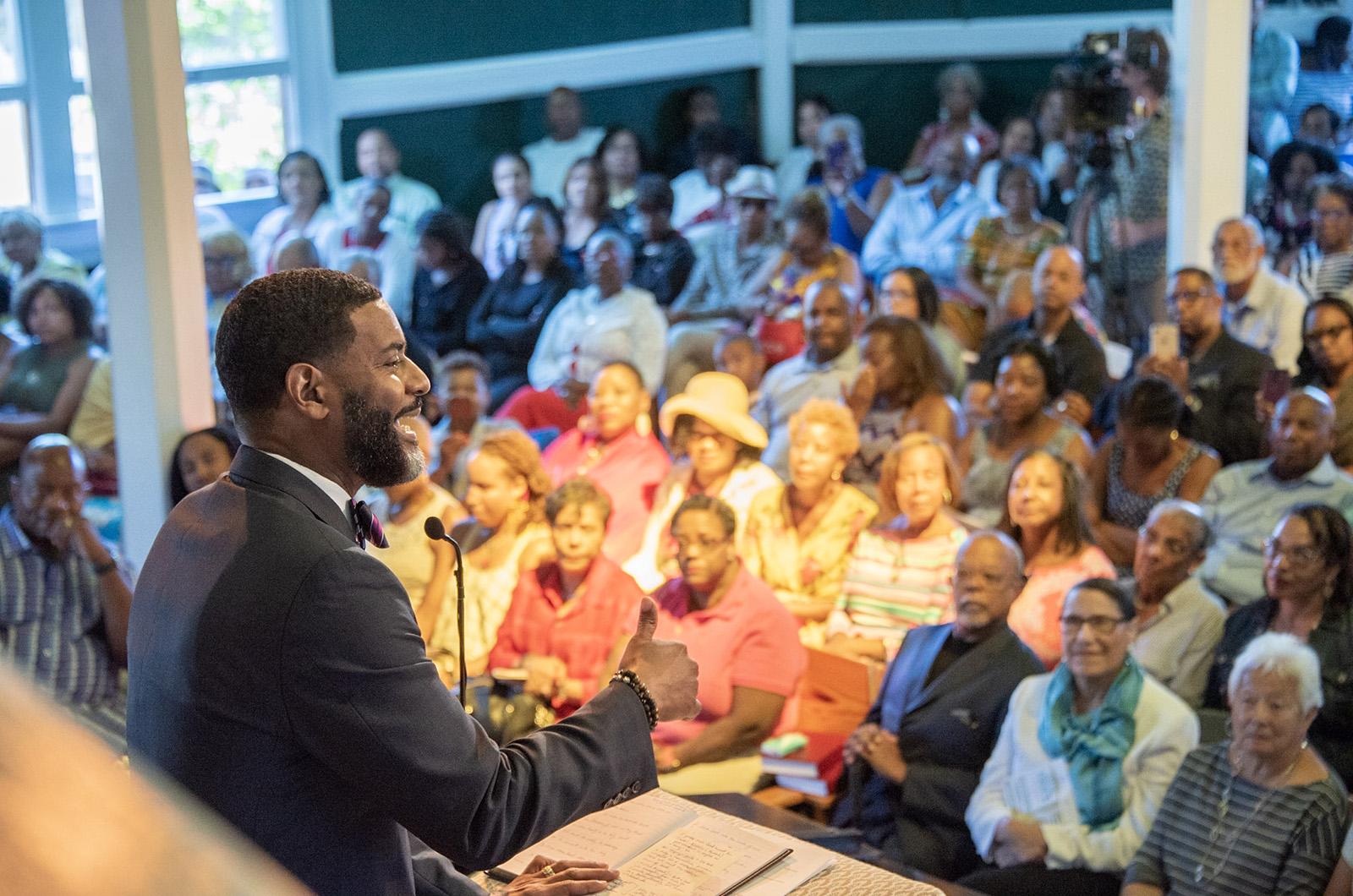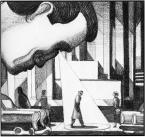For Reverend Otis Moss 3rd, the basis for justice must always be love.
It is a theme he explores in his new book, Dancing in the Darkness: Spiritual Lessons for Thriving in Turbulent Times, and how he approaches is ministry.
“It’s a book for anyone who is concerned, passionate, angry, about the direction the country is going in, not necessarily Christians,” Rev. Moss said in a recent interview with the Gazette. “It’s a book for people who want to see a transformed nation.”
Rev. Moss is the senior pastor at the Trinity United Church of Christ in Chicago, Ill., and each summer he preaches at Union Chapel in Oak Bluffs as a part of its summer guest series. In August, his appearance there was standing room only with lines stretching out into the courtyard.
Dancing in the Darkness pulls stories from his own congregation and weaves them with current events and sermonic teachings with the goal of redefining how individuals view freedom and justice in America.
Rev. Moss didn’t count on his book coming out during a renewed wave of political activism against police brutality but he wasn’t particularly surprised, either.
The outcry after the death of Tyre Nichols, who was killed in January by five police officers during a traffic stop in Memphis, mirrors the conditions following the Ferguson protests in 2014 that prompted Rev. Moss to write an essay entitled A Letter to My Son, about the unequal treatment young black men face in the criminal justice system. The essay’s reception included a sharply divided reaction, he said, between those who understood his message of inequality and those who did not. The varied reactions prompted Rev. Moss to turn the essay into a book.
“It was very clear from that reaction that people needed to not only hear from someone who’s on the ground but also be reintroduced to the values that allow us to flourish: love, justice, compassion, respect, grace, mercy...most importantly, truth-telling,” he said.
When tragedies such as the death of Mr. Nichols become amplified through social media, Rev. Moss continued, these values become particularly obscured.
“Social media can be a great organizing tool,” he said. “But the algorithm of social media drives you to what is most negative and what causes the most outrage. The companies want to keep you scrolling, so they don’t send you what is affirming, what is developing, what will cause you to engage with civic dialogue.”
Through his divinity work, Rev. Moss said he has come to challenge what he sees as a tendency towards fundamentalism, both in religion and secular morality.
“Historically, human beings have used stories to show ultimate truths or universal truths,” he said. “The poetry in the songs, the metaphors...[are all] giving imagery that helps show people how we ought to live. We do that through story, not necessarily through parsing and arguing that my story is more accurate than your story.”
His willingness to explore beyond concrete views of morality is also necessary to approach each story with empathy and compassion, he said.
“People think of morality in a black and white way, but practice it in tones of gray,” he explained.
Many of the stories in Rev. Moss’s book came from his own congregation, including that of Donna Hammond, a deacon and 45-year member of the church, who as a young girl had been molested.
“She felt like a broken vessel, damaged goods, and she lived with a deep distrust of men and authority. She had no regular work and no vision of her own future," Rev. Moss writes in his book.
But through a friend, she began to find community in church.
“Treated with respect, she began to see in herself what the church people saw: a talented, valuable member of the community with gifts to contribute,” Rev. Moss writes.
Ms. Hammond’s journey is a familiar one to Rev. Moss, whose congregational members, he said, often feel disempowered.
“There’s a cadre of obstacles,” he said. “Poverty, plus white supremacy, plus limited imagination all equals a diminishing of the human spirit.”
One of his main charges as a pastor is renewing that faith in the human spirit. Early in his book, he quotes writer G.K. Chesterton, who once said: “Fairy tales are more than true, not because they tell us that dragons exist, but because they tell us that dragons can be beaten.”
That message of hope is what drives Dancing in the Darkness, with every story concluding in that very lesson: dragons can be beaten. That’s not to say Rev. Moss believes everyone will wake up one day with a dragon head magically hanging over our mantle. Community and mentorship are necessary to uplift individuals strapped by an unjust system, he said. But to make a new, just system requires stretching the boundaries of creativity and imagination.
“African tradition refuses to see chaos as the end of the world,” Rev. Moss said.
Sailors, he added, learn to move forward not by going through the wind but by tacking against it, adapting their vessels to the chaos.
“You must look at [the storm] and find the particular laws to build a ship,” he continued. “This moment is calling us to build a new ship.”








Comments (1)
Comments
Comment policy »